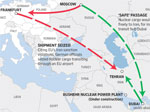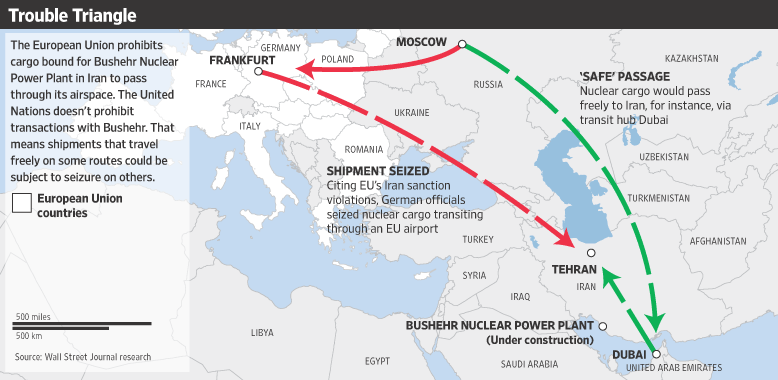 Wall Street Journal: German prosecutors are investigating whether Russia’s main nuclear exporter broke European rules by routing Iran-bound cargo through Europe—an incident that diplomats say turned into a major battleground as world powers hashed out international sanctions against Iran.
Wall Street Journal: German prosecutors are investigating whether Russia’s main nuclear exporter broke European rules by routing Iran-bound cargo through Europe—an incident that diplomats say turned into a major battleground as world powers hashed out international sanctions against Iran.
The Wall Street Journal
By DAVID CRAWFORD
FRANKFURT—German prosecutors are investigating whether Russia’s main nuclear exporter broke European rules by routing Iran-bound cargo through Europe—an incident that diplomats say turned into a major battleground as world powers hashed out international sanctions against Iran.
The shipments wouldn’t break sanctions agreed on at the United Nations, including new rules approved Wednesday. But the U.S. and European Union plan to use their own regimes to put bigger obstacles in front of Iran’s nuclear development—and to make up for the weaknesses of the U.N. sanctions, which were softened to get agreement from Russia and China.
The formal investigation into Russia’s activities by Frankfurt prosecutors, which has previously not been disclosed, provides a window into the extent of the ongoing nuclear traffic with Iran, as well as the international tug of war over how much of it to stop.
At the core is the difference between the U.N.’s rules and Europe’s harsher strictures. In November 2009 and January 2010, Germany inspected shipments of equipment originating in Russia and bound for an Iranian nuclear-power plant. German customs agents seized the cargo—computer and nuclear-monitoring equipment, prosecutors say—on the grounds that EU law prohibits any Iran-bound nuclear-related equipment from being shipped across its territory.
Iran denies it is pursuing weapons. Under the U.N.’s rules, Russia can help Iran pursue peaceful nuclear applications, such as building the Bushehr reactor where the intercepted Russian shipments were allegedly bound. An Iran-bound shipment for the plant could travel by a different route—though Dubai, for example—without running afoul of U.N. dictates and without EU rules coming into play.
Russia, which has lucrative deals to help Iran develop nuclear power, argues that the EU and U.S. shouldn’t add their own, tougher strictures once the U.N. agrees on a sanctions regime.
Russian diplomats in New York raised the German seizures several times as examples of the problem during negotiations on the latest round of U.N. sanctions against Iran, according to two diplomats familiar with the negotiations. But the final U.N. Security Council resolution didn’t ban tougher sanctions by individual countries.
Russia did win other compromises, including an exception to allow it to sell Iran long-range surface-to-air S-300 missiles, according to a senior diplomat familiar with the discussion. On Friday, France said that Russian Prime Minister Vladimir Putin told French President Nicolas Sarkozy that Moscow would nevertheless continue to put off delivering those missiles.
Meanwhile, this week the White House signaled it would push further on its own sanctions, characterizing the U.N. resolution as a foundation to build on.
Russia protested. “We do not accept attempts to put oneself above the Security Council,” its foreign ministry said in a statement Wednesday.
Frankfurt prosecutors say they launched their investigations after customs officials seized air-freight cargo en route from Moscow to Tehran that they determined contained monitoring equipment bound for the Bushehr Nuclear Power Plant, which has been haltingly under construction since the 1970s. The EU argues that helping even the civilian side of Iran’s nuclear program serves to strengthen the full nuclear program, so it prohibits dealings with Bushehr.
The prosecution spokeswoman said the November 2009 shipment, seized in a Frankfurt airport warehouse, was handled by Lufthansa Cargo, a subsidiary of Deutsche Lufthansa AG. On Jan. 15, 2010, agents seized a separate shipment assigned to Emirates Sky Cargo, a subsidiary of Dubai-based Emirates Group, and AirBridge Cargo Airlines, a subsidiary of Russia’s Volga-Dnepr Group, she said.
In February, customs investigators acting on behalf of the prosecutors searched the Frankfurt Airport offices of Lufthansa Cargo, Emirates Sky Cargo and AirBridge Cargo Airlines, the spokeswoman said. The prosecutors are examining the alleged role in transporting nuclear-related supplies through Europe by workers of the three airlines, and of employees of the alleged source of the cargo—JSC AtomStroyExport, the export arm of Russia’s Atomic Energy Ministry.
AtomStroyExport has been helping Iran at Bushehr since signing a $1 billion contract in 1995, the Russian firm’s website says. Russia recently committed to opening the plant by August.
Freight papers of the seized shipments named as recipient what the spokeswoman says was, by EU law, a “blacklisted entity,” the Atomic Energy Organization of Iran, which oversees Bushehr.
Both Russia and Iran say AtomStroyExport’s participation in the construction of the Bushehr plant is legal. An AtomStroyExport spokeswoman said none of its shipments were affected by sanctions, stopped by German investigators or addressed to Iran’s atomic agency.
A German Foreign Ministry spokesman and a top Russian diplomat declined to comment on the seizures and discussions.
It isn’t clear why the Russian company chose to route its supplies through Europe. A Lufthansa Cargo spokesman said the carrier complies with EU regulations and has “strengthened its controls in cooperation with the German Customs Office” since the seizure. A spokesman representing AirBridge Cargo said is cooperating with German officials but that no allegations have been made against the firm. Emirates Sky Cargo said the January shipment hadn’t come into its possession after the Russian partner flew it to Frankfurt. “We never touched the cargo,” a spokeswoman said.
A European intelligence official said he believed the shipments seized in Europe represent the “tip of the iceberg” of Russian shipments to Iran. He said the Germany seizures were having an impact, however. “The closure of EU airspace to Iran nuclear trade decreases delivery options and increases the cost of business,” the official said.
—Joe Lauria and Richard Boudreaux contributed to this article.



